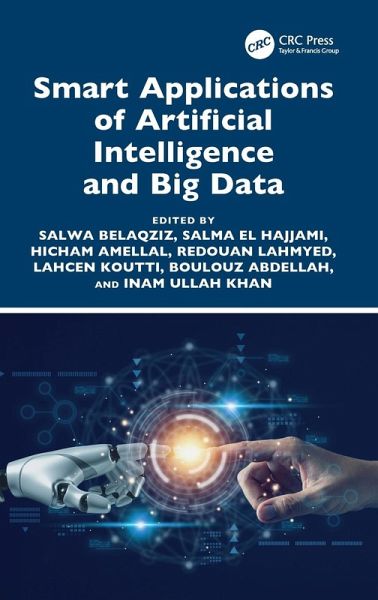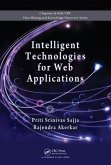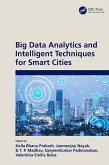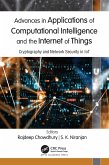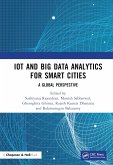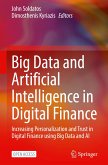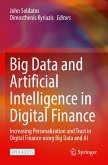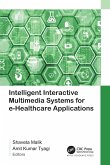Smart Applications of Artificial Intelligence and Big Data
Herausgeber: Abdellah, Boulouz; Belaqziz, Salwa; Hajjami, Salma El; Lahmyed, Redouan; Koutti, Lahcen; Ullah Khan, Inam; Amellal, Hicham
Smart Applications of Artificial Intelligence and Big Data
Herausgeber: Abdellah, Boulouz; Belaqziz, Salwa; Hajjami, Salma El; Lahmyed, Redouan; Koutti, Lahcen; Ullah Khan, Inam; Amellal, Hicham
- Gebundenes Buch
- Merkliste
- Auf die Merkliste
- Bewerten Bewerten
- Teilen
- Produkt teilen
- Produkterinnerung
- Produkterinnerung
Smart Applications of Artificial Intelligence and Big Data covers a wide range of topics related to AI and big data, including machine learning, deep learning, natural language processing, computer vision, data analytics, and data mining.
Andere Kunden interessierten sich auch für
![Intelligent Technologies for Web Applications Intelligent Technologies for Web Applications]() Priti Srinivas SajjaIntelligent Technologies for Web Applications194,99 €
Priti Srinivas SajjaIntelligent Technologies for Web Applications194,99 €![Big Data Analytics and Intelligent Techniques for Smart Cities Big Data Analytics and Intelligent Techniques for Smart Cities]() Big Data Analytics and Intelligent Techniques for Smart Cities179,99 €
Big Data Analytics and Intelligent Techniques for Smart Cities179,99 €![Advances in Applications of Computational Intelligence and the Internet of Things Advances in Applications of Computational Intelligence and the Internet of Things]() Advances in Applications of Computational Intelligence and the Internet of Things191,99 €
Advances in Applications of Computational Intelligence and the Internet of Things191,99 €![IoT and Big Data Analytics for Smart Cities IoT and Big Data Analytics for Smart Cities]() IoT and Big Data Analytics for Smart Cities160,99 €
IoT and Big Data Analytics for Smart Cities160,99 €![Big Data and Artificial Intelligence in Digital Finance Big Data and Artificial Intelligence in Digital Finance]() Big Data and Artificial Intelligence in Digital Finance37,99 €
Big Data and Artificial Intelligence in Digital Finance37,99 €![Big Data and Artificial Intelligence in Digital Finance Big Data and Artificial Intelligence in Digital Finance]() Big Data and Artificial Intelligence in Digital Finance34,99 €
Big Data and Artificial Intelligence in Digital Finance34,99 €![Intelligent Interactive Multimedia Systems for e-Healthcare Applications Intelligent Interactive Multimedia Systems for e-Healthcare Applications]() Intelligent Interactive Multimedia Systems for e-Healthcare Applications202,99 €
Intelligent Interactive Multimedia Systems for e-Healthcare Applications202,99 €-
-
-
Smart Applications of Artificial Intelligence and Big Data covers a wide range of topics related to AI and big data, including machine learning, deep learning, natural language processing, computer vision, data analytics, and data mining.
Hinweis: Dieser Artikel kann nur an eine deutsche Lieferadresse ausgeliefert werden.
Hinweis: Dieser Artikel kann nur an eine deutsche Lieferadresse ausgeliefert werden.
Produktdetails
- Produktdetails
- Verlag: Taylor & Francis Ltd
- Seitenzahl: 304
- Erscheinungstermin: 22. Mai 2025
- Englisch
- Abmessung: 234mm x 156mm
- ISBN-13: 9781032664279
- ISBN-10: 1032664274
- Artikelnr.: 72487200
- Herstellerkennzeichnung
- Libri GmbH
- Europaallee 1
- 36244 Bad Hersfeld
- 06621 890
- Verlag: Taylor & Francis Ltd
- Seitenzahl: 304
- Erscheinungstermin: 22. Mai 2025
- Englisch
- Abmessung: 234mm x 156mm
- ISBN-13: 9781032664279
- ISBN-10: 1032664274
- Artikelnr.: 72487200
- Herstellerkennzeichnung
- Libri GmbH
- Europaallee 1
- 36244 Bad Hersfeld
- 06621 890
Dr. Salwa Belaqziz is a full Professor in Computer Science at the Faculty of Sciences, Ibn Zohr University in Agadir and an affiliate professor at the Center for Remote Sensing Applications of the Mohammed VI Polytechnic University. She received her PhD degree in Computer Science from Cadi Ayyad University of Marrakech in 2014, which focused on the development of a decision support approach for gravity irrigation systems management, based on the combination of multi-agent modeling, remote sensing and optimization by evolutionary algorithms. Salwa Belaqziz has worked at the National Institute of Agricultural Research in Toulouse as postdoctoral researcher, where she participated in the development of an agent-based modeling and simulation platform to assess the environmental, economic and social impacts of various management strategies and policies regarding the management and uses of water resources. Her main research interests include irrigation scheduling, smart farming and decision support systems development, based on approaches combining artificial intelligence, big data, data science, agent-based modeling, physics-based modeling, remote sensing, IoT and optimization algorithms for integrated water resources management. Salwa Belaqziz co-supervises four PhD students and participates in national and international research projects (ASSIWAT, MorSnow, GeanTech, PRIMA,...). She has published papers in international peer-reviewed journals and participated in several international conferences. Dr. Salma El Hajjami is an Assistant Professor and Researcher at Faculty of science, Ibn Zohr University, Agadir, Morocco since 2021. She is a Ph.D, graduated in 2021 in Computer Science, at the Laboratory of Artificial Intelligence, Data Science and Emerging Systems from ENSA, Sidi Mohammed Ben Abdellah University, Fez, Morocco. She is a Computer Science Engineer, graduated in 2015 from National School of Applied Sciences Fez, Morocco. She has previous expertise acting in Ministry of interior Morocco as Research and Development Engineer from 2017 to 2021. She is member of International Association of Engineers (IAENG) and International Association of Online Engineering. Dr. Salma has made contributions in the fields of Social Big Data, Semantics Analytics, Anomaly Detection, and Imbalanced Big Data published at international conferences and journals. Her main research topics are Machine Learning, Deep Learning, Imbalanced Big Data, Data Science and Blockchain. She has served and continues to serve on technical program and organizer committees of several conferences also as a reviewer of numerous international journals. Dr. Redouan Lahmyed received the Ph.D. degree in computer science from the Faculty of Science, University Ibn Zohr, Agadir, Morocco in 2019. He also received his master's degree in Computer Science (M.Sc) from the Department of Studies in Computer Science at The University of Mysore, Karnataka, India. His research interests include image processing and computer vision. Apart from his experience with teaching and working with researchers from different countries, he published and served as a reviewer at numerous international conferences and journals. Dr. Hicham Amellal is an Assistant Professor, Department of Computer Science Faculty of Sciences Ibn Zohr University. He holds a doctorate in information security from Mohamed V University, Faculty of Sciences Rabat-Morocco, and computer engineer, laureate of Kazan State Technological University, Russian Federation. Prof Amellal has different experiences in different regions and in various higher educational institutions with diverse academic configurations and in different level such as: International academy Mohammad VI of civil aviation, national school of applied sciences al Hoceima, Faculty of sciences Agdal and Faculty of Science and Technology al Hoceima. Prof Amellal is member of the workshop organizing committee: Cyber Crime and Quantum Information, 18 to 19 Oct 2016, Rabat VSST Association Chapter Morocco, and Quantum Africa C Advances in Quantum Sciences, Faculty of Sciences, 22 to 26 Sept 2014, Rabat. His research interests include IT security, Quantum cryptography, Post quantum cryptography and Quantum Algorithms. Information Classification: General Dr. Koutti Lahcen is a Professor at the Department of Computer Science within the Faculty of Science at Ibn Zohr University in Agadir, Morocco. He obtained his Ph.D. in computational physics from University Paul Verlaine in France in 1999 and his Habilitation degree from Ibn Zohr University in 2010. Prior to his academic career, Dr. Lahcen worked as a software engineer at the multinational company "ALDATA". His research interests revolve around Artificial Intelligence, Computer Vision, Medical Imaging, and Feature Extraction. Dr. Lahcen is a member of the Computer Systems and Vision Laboratory and has an h-index of 7, having co-authored 48 publications that have received 237 citations. Additionally, he currently manages the AL KHAWARZIMI project (2020/20). Dr. Abdellah Boulouz is a university professor in the IT department at the Faculty of Sciences, University Ibn Zohr in Agadir. He holds a PhD in Microelectronics, Microsensors, and Systems, which he obtained from the University of Montpellier 2, IES (Institut d'Électronique et des Systèmes). He also has a Master's degree in Computer Engineering and Open Systems/Computer Networks (MSIO) from Ecole Centrale Paris (ECP France) and a "Diplôme des Études Approfondies" in Instrumentation Sciences and Physics from the University of Reims Champagne-Ardenne. He worked as a researcher (Postdoctoral position) at the École Polytechnique Fédérale EPFL in Lausanne, Switzerland, and the Leibniz-Institut für Festkörper und Werkstoffforschung, IFW Dresden, Germany. He is also the president and founder of the association Sciences Pour Tous (https://spt.ma) and has several publications in specialized journals and international conferences with peer review. Dr. Inam Ullah Khan is visiting researcher at king's College London, Uk. Also, he was faculty member at different universities in Pakistan which include Center for Emerging Sciences Engineering & Technology (CESET), Islamabad, Abdul Wali Khan University, Garden Campus, Timergara Campus, University of Swat & Shaheed Zulfikar Ali Bhutto Institute of Science and Technology (SZABIST), Islamabad Campus. He completed his Ph.D. in Electronics Engineering from Department of Electronic Engineering, Isra University, Islamabad Campus, School of Engineering & Applied Sciences (SEAS). Also, he did his M.S. degree in Electronic Engineering at Department of Electronic Engineering, Isra University, Islamabad Campus, School of Engineering & Applied Sciences (SEAS). He had done undergraduate degree in Bachelor of Computer Science from Abdul Wali Khan University Mardan, Pakistan. Apart from that his Master's thesis is published as a book on topic "Route Optimization with Ant Colony Optimization (ACO)" in Germany which is available on Amazon. More interestingly, he use to teach subjects like computer network security, artificial intelligence, evolutionary computing, professional practice, software engineering, data communication & networks, data base, cyber security, visual programming and introduction to programming. He authored/coauthored more than 30 research articles in reputable journals, conferences and book chapters.
I- Artificial Intelligence (AI) 1. Resource Utilization and Cost
Implications of Container Live Migration in Clouds: An Approach Performed
on Amazon Web Services (AWS) 2. A Deep Learning Framework for
Gastrointestinal Abnormalities Classification and Localization within WCE
Images 3. Breast Cancer Segmentation using U-Net and Transfer Learning
Approaches 4. Transforming Graphics Processing Unit-Accelerated Machine
Learning Environments with Docker Cloud Containers 5. A Review of
Image-based Deep Learning Approaches for Atmospheric Visibility Estimation
6. Advancing Cloud Security: Evaluating Interpretable Machine Learning
Algorithms for DDoS Attack Detection 7. Classification of Gastrointestinal
Bleeding in WCE Images Based on Fusing a Stabilizing Block with Xception 8.
Lung Tumors Recognition and Classification in CT Scan Images Using CNNs,
Transfer Learning, and Ensemble Learning 9. A new pedestrian detection
method for intelligent surveillance systems II-Smart Applications 10.
Compensation of Harmonic Currents for Shunt Active Power Filter Using
ADALINE Neural Network 11. Control of a Grid-Connected Photovoltaic System
Based on MPPT and Vector Control 12. GeoArgania: A Geolocation Mapping
Dataset of Argania Trees in the Souss Region 13. PSM Model for NoSQL
Key-Value Databases Through Model Programming 14.Body Temperature Screening
During COVID-19 Pandemic15. Signal Processing System for Heart Rate
Extraction Using Plethysmography Analysis Through LabVIEW Platform 16.
Investigating the Impacts of COVID-19 Over Time Using Sentiment Analysis
and Topic Modeling III- Internet of Things (IoT) AND Big Data 17. Smart EV
Routing to Charging Stations for Traffic Optimization in Smart Cities: A
Case Study in Agadir 18. Dual-Scored Dimensionality Reduction and Spectral
Unmixing for Hyperspectral Data Analysis 19. Counterfeit Medicine Detection
System 20. SDN Enabled Intrusion Detection System Using Machine Learning
and Neural Network Schemes 21. Information Security Awareness in Higher
Education: The Need for a Tailor-Made Suit
Implications of Container Live Migration in Clouds: An Approach Performed
on Amazon Web Services (AWS) 2. A Deep Learning Framework for
Gastrointestinal Abnormalities Classification and Localization within WCE
Images 3. Breast Cancer Segmentation using U-Net and Transfer Learning
Approaches 4. Transforming Graphics Processing Unit-Accelerated Machine
Learning Environments with Docker Cloud Containers 5. A Review of
Image-based Deep Learning Approaches for Atmospheric Visibility Estimation
6. Advancing Cloud Security: Evaluating Interpretable Machine Learning
Algorithms for DDoS Attack Detection 7. Classification of Gastrointestinal
Bleeding in WCE Images Based on Fusing a Stabilizing Block with Xception 8.
Lung Tumors Recognition and Classification in CT Scan Images Using CNNs,
Transfer Learning, and Ensemble Learning 9. A new pedestrian detection
method for intelligent surveillance systems II-Smart Applications 10.
Compensation of Harmonic Currents for Shunt Active Power Filter Using
ADALINE Neural Network 11. Control of a Grid-Connected Photovoltaic System
Based on MPPT and Vector Control 12. GeoArgania: A Geolocation Mapping
Dataset of Argania Trees in the Souss Region 13. PSM Model for NoSQL
Key-Value Databases Through Model Programming 14.Body Temperature Screening
During COVID-19 Pandemic15. Signal Processing System for Heart Rate
Extraction Using Plethysmography Analysis Through LabVIEW Platform 16.
Investigating the Impacts of COVID-19 Over Time Using Sentiment Analysis
and Topic Modeling III- Internet of Things (IoT) AND Big Data 17. Smart EV
Routing to Charging Stations for Traffic Optimization in Smart Cities: A
Case Study in Agadir 18. Dual-Scored Dimensionality Reduction and Spectral
Unmixing for Hyperspectral Data Analysis 19. Counterfeit Medicine Detection
System 20. SDN Enabled Intrusion Detection System Using Machine Learning
and Neural Network Schemes 21. Information Security Awareness in Higher
Education: The Need for a Tailor-Made Suit
I- Artificial Intelligence (AI) 1. Resource Utilization and Cost
Implications of Container Live Migration in Clouds: An Approach Performed
on Amazon Web Services (AWS) 2. A Deep Learning Framework for
Gastrointestinal Abnormalities Classification and Localization within WCE
Images 3. Breast Cancer Segmentation using U-Net and Transfer Learning
Approaches 4. Transforming Graphics Processing Unit-Accelerated Machine
Learning Environments with Docker Cloud Containers 5. A Review of
Image-based Deep Learning Approaches for Atmospheric Visibility Estimation
6. Advancing Cloud Security: Evaluating Interpretable Machine Learning
Algorithms for DDoS Attack Detection 7. Classification of Gastrointestinal
Bleeding in WCE Images Based on Fusing a Stabilizing Block with Xception 8.
Lung Tumors Recognition and Classification in CT Scan Images Using CNNs,
Transfer Learning, and Ensemble Learning 9. A new pedestrian detection
method for intelligent surveillance systems II-Smart Applications 10.
Compensation of Harmonic Currents for Shunt Active Power Filter Using
ADALINE Neural Network 11. Control of a Grid-Connected Photovoltaic System
Based on MPPT and Vector Control 12. GeoArgania: A Geolocation Mapping
Dataset of Argania Trees in the Souss Region 13. PSM Model for NoSQL
Key-Value Databases Through Model Programming 14.Body Temperature Screening
During COVID-19 Pandemic15. Signal Processing System for Heart Rate
Extraction Using Plethysmography Analysis Through LabVIEW Platform 16.
Investigating the Impacts of COVID-19 Over Time Using Sentiment Analysis
and Topic Modeling III- Internet of Things (IoT) AND Big Data 17. Smart EV
Routing to Charging Stations for Traffic Optimization in Smart Cities: A
Case Study in Agadir 18. Dual-Scored Dimensionality Reduction and Spectral
Unmixing for Hyperspectral Data Analysis 19. Counterfeit Medicine Detection
System 20. SDN Enabled Intrusion Detection System Using Machine Learning
and Neural Network Schemes 21. Information Security Awareness in Higher
Education: The Need for a Tailor-Made Suit
Implications of Container Live Migration in Clouds: An Approach Performed
on Amazon Web Services (AWS) 2. A Deep Learning Framework for
Gastrointestinal Abnormalities Classification and Localization within WCE
Images 3. Breast Cancer Segmentation using U-Net and Transfer Learning
Approaches 4. Transforming Graphics Processing Unit-Accelerated Machine
Learning Environments with Docker Cloud Containers 5. A Review of
Image-based Deep Learning Approaches for Atmospheric Visibility Estimation
6. Advancing Cloud Security: Evaluating Interpretable Machine Learning
Algorithms for DDoS Attack Detection 7. Classification of Gastrointestinal
Bleeding in WCE Images Based on Fusing a Stabilizing Block with Xception 8.
Lung Tumors Recognition and Classification in CT Scan Images Using CNNs,
Transfer Learning, and Ensemble Learning 9. A new pedestrian detection
method for intelligent surveillance systems II-Smart Applications 10.
Compensation of Harmonic Currents for Shunt Active Power Filter Using
ADALINE Neural Network 11. Control of a Grid-Connected Photovoltaic System
Based on MPPT and Vector Control 12. GeoArgania: A Geolocation Mapping
Dataset of Argania Trees in the Souss Region 13. PSM Model for NoSQL
Key-Value Databases Through Model Programming 14.Body Temperature Screening
During COVID-19 Pandemic15. Signal Processing System for Heart Rate
Extraction Using Plethysmography Analysis Through LabVIEW Platform 16.
Investigating the Impacts of COVID-19 Over Time Using Sentiment Analysis
and Topic Modeling III- Internet of Things (IoT) AND Big Data 17. Smart EV
Routing to Charging Stations for Traffic Optimization in Smart Cities: A
Case Study in Agadir 18. Dual-Scored Dimensionality Reduction and Spectral
Unmixing for Hyperspectral Data Analysis 19. Counterfeit Medicine Detection
System 20. SDN Enabled Intrusion Detection System Using Machine Learning
and Neural Network Schemes 21. Information Security Awareness in Higher
Education: The Need for a Tailor-Made Suit

